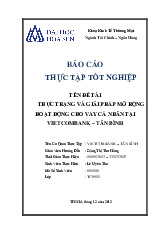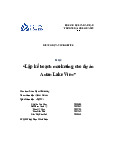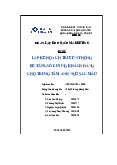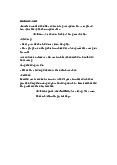















Preview text:
Contents Intr d
o uction ......................................................... 3
What sort of reflective essay might I have to do?
............................................................................ 4
Writing style ........................................................ 6
Gibbs’ model of reflection .................................... 7
Description ....................................................... 8
Feelings ........................................................... 8
Evaluation ........................................................ 9
Analysis ............................................................ 9
Conclusion ..................................................... 10
Action plan ..................................................... 10 An example of a short reflect v i e assignment .... 11
References ........................................................ 17
This work is licensed under a Creative Commons Attribution-
NonCommercial-ShareAlike 4.0 International License. 2 Introduction
During your time at University, it is likely that you will be asked to write at l a e st one reflect v i e
essay. Many students find this difficult, because reflect v
i e writing is quite different from other
assignments and discussing your own feelings and performa c
n e in academic work can be t i r cky
at first. By reflecting, you will be looking back at
something which has happened in order to show what you have learned from it . You’ll need to
explain what happened, how you felt a bout it,
what you learned, whether you could have handled things differentl y and what you need to learn or do differentl y in the future. This help
guide will take you through the process of producing a reflect v i e essay. 3
What sort of reflective essay might I have to do?
You’re most likely to be asked to write
reflectively about an incident which has hap e
p ned on your placement. You might also
have to write reflectively about the process you
went through in order to carry out a project or to
produce another assignment. This kind of
assignment feels strange at first to many
students, and you might be wondering where to
start with your essay. Before you start, check the following: 1. Wh t
a have you been asked to write about?
For example, if you have to reflect on an incident
which occurred during your placement, a c n o y u think of a u s itable incident? H v a e you been given
guidelines about what kind of incident t o use? I t
doesn’t necessarily have to be something negative, and y ou could choose t o writ e about
something which went really well. 2. Have you been tol d t o use a certai n ‘model of
reflection’? There are many different models which help to gu d
i e you through the process of reflecting, n
a d while they all help you to reach the
same end result, they may have different 4
headings and sections. Make sure you know
which model you have to use. The most
commonly-used model is by Gibbs (1988), which
is the model we will look at in most detail here. If
you are asked to use another model such as
Johns (1995) or ‘What? So What? Now What?’
(Borton, 1970, updated by Drisco ll, 9 1 94), you will
structure the assignment slightly diffe e r ntl y but the
purpose and content will still be the same.
3. Have you been given any instructions about how
to present your assignment? You may have been asked t
o use headings to separate the different
sections of your assignment, s o make sure that
you check the requirements so that you set out your assignment co r r ectly. Writing style Reflect v i e writing is dif e f rent from most other assignments beca s
u e it is probably the only time
you will be required to use “I” and “me” in an
essay. You will be writing about your own
personal experience and feelings, n a d in reflect v
i e writing it is important to tell the reader
what you think and feel about things. Many students find thi
s difficult to get used to, as they
have always been told to avoid the use of “I” in
assignments, and to avoid giving their own 5 opinion. Gibbs’ model of reflection There are six stages in Gibbs ’ model, and each
will be discussed in turn here. There is also a
sample assignment at the end of this guide, which is written using Gi b b s’ model and is
structured using headings for clarity.
Gibbs’ model of reflection, from Gibbs, G. (1988).
Oxford: Further Education Unit. 6 Description In this e
s ction, you’ll need to explain what
happened. There might be some background
information, such as where you were working at
the time (being careful not to identify individual people or places). Tell th e reader who was
involved and describe the incident t i self without
discussing your feelings yet – just the facts are required at this stage. Feelings
Discuss your feelings and thoughts ab u o t the
incident in this section. How did you feel a t the
time? What about afterwards? What did you think
at the time? What did you think about the
incident afterwards? You can discuss your
emotions honestly in this sectio , n but make sure
to remember at all times that this is an academic piece of writing. Be a c reful not to be offensive,
make sure not to identify any of the people involved, and remember that i t might not only be
your tutor who reads the assignment . 7 Evaluation
In evaluating the incident, you’ll be looking at how well things went. Ho w did you react to the situation, and ho
w did other people react? What
was good and what was bad about the experie c n e? If you are writin g about a difficult
incident, did you feel that the situation was
resolved afterwards? Why/why not? You will
probably need some theory and the work of other
authors (references) in this secti n o . Analysis
Leading on from your evaluation, your analysis will look in g
reater depth at what might have
helped or hindered the situation and ho w or
why the incident came about in the first place. Important y l , you will need to bring t e h ory and
other authors’ work in here. Th e most common
reason why students get poor marks for reflect v
i e assignments is that they don’t bring
the theory and experience together in this section. 8 Conclusion In this e s ction, think a o b ut whether you could
have done anything else during the incident, and
what you have learned from it. Could you have responded in a differ n e t way? If you are talking about a posit v
i e experience will you do the same
again to ensure a positive out o c me, or is there
anything you could change to improve things
even further? If the incident was negative, how
could you have avoided it happening or how can
you make sure it doesn’t happen again ? Action plan
Your action plan sums up anything you need to
do in order to improve things for next time. Do
you perhaps need to learn about something or
attend some training? Could you ask your tutor or placement u s pe vi r sor for some advice? Wh t a
can you do which means that, if the situation
arises again, you will be better equipped to cope with it? 9 An exam l p e of a short reflective assignment
This example uses the headings described above
to demonstrate the kinds of things you might
need to put in each section. The references are
made up, as is the content of the assignment, it
is purely to show how a reflective assignment might look. Description I am currentl
y on a teaching practice placem nt i e n an adult educatio
n college in the south-west of England, learning how to te c a h GCS E maths to
various groups of adults. I hav o e nly just started the
placement, so I am mainly assisting th e class tutor s
and have just started planning and delivering a small par t o f each les on. s 10




